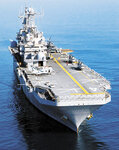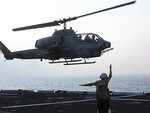


TOMAH, Wis. – Kitt Hernandez served four years in the United States Navy, spending her days on the open water. Today, the fourth-generation dairy farmer is rooted on land and milks 50 cows in a stanchion barn with the help of her dad, Kurt Westpfahl, and her family – husband, Jose, and their three children, Aidan, James and Jax – near Tomah.
[[In-content Ad]]
Before Hernandez returned to her family’s farm in 2005, she was stationed in Pensacola, Florida. Hernandez had just finished boot camp when the Sept. 11, 2001, terrorist attacks occurred.
“When I saw that second plane hit and I couldn’t call home, the reality of it hit me,” Hernandez said. “I told myself, ‘You have to prepare for war.’ Less than a year later, I was over in the gulf.”
After graduating as an aviation boatswain’s mate handler, Hernandez was stationed in Norfolk, Virginia, on the USS Nassau. The ship is an amphibious carrier with an 860-foot flight deck which was used to land and launch helicopters and other aircraft that were usually transporting supplies or people.
At a time when the Navy was just starting to allow women on board, Hernandez said she became the 32nd female to ever board the ship.
On the day Hernandez turned 19, her dad was involved in a farming accident. She took a month of leave to go home and run the farm while he recovered before returning to Virginia.
After months of training on the ship, Hernandez was deployed in August 2002. The first few months of deployment were spent delivering Marines to land who were part of joint forces in Kosovo at the time.
Hernandez went on to become the first woman in her crew to become a tractor driver on board – using tugs to bring aircraft from the hangar bay to the flight deck.
She was eventually promoted to tractor king. By the end of her enlistment, she was a landing signalman enlisted, which was another first for a female on her crew.
“I think my biggest accomplishment in the Navy was to be the first female to do these things,” Hernandez said. “I paved the way for other women on the flight deck to do so.”
Hernandez said a team of Navy SEALS came aboard the ship via an aircraft she landed. She found out years later that the team of SEALS included Chris Kyle, the inspiration for the movie, “American Sniper.”
Hernandez said every day was an adrenaline rush, and the best way to cope was to try not to think about what was going on at home or what would happen next.
“Just throw yourself into your work,” Hernandez said. “If you think about it, you’re going to go crazy.”
One night, the captain called a meeting to inform the crew that war had been declared; their deployment was extended indefinitely.
“The captain gave a speech about being the tip of the spear and said we just declared war on Iraq,” Hernandez said. “At that moment, my head dropped. I looked up and everybody’s head on the flight deck dropped. They were looking at their feet. And I thought, ‘Now it’s getting real for us.’”
The ship was stationed in the Persian Gulf, and Hernandez said they were close enough to see cars driving on land along the coast of Kuwait. Every morning, Hernandez woke up to the sight of the USS Mercy, a hospital ship.
“That kind of unnerved me,” Hernandez said. “It was very real.”
The Navy crew was responsible for loading rockets and missiles into aircraft that would then launch them into Baghdad. Hernandez remembers going to the stern of the ship with her friends and watching Baghdad be bombed.
“The horizon would just light up like a thunderstorm coming in,” Hernandez said. “We were just kind of awestruck because it was really beautiful. But then the realization of a city being bombed, and people being in that city, kind of hits you afterward.”
The ship was also at risk of being attacked, Hernandez said.
A silkworm missile was launched at the USS Nassau but fell short and hit a mall in Kuwait City instead. The strike made news in America and is something Hernandez’s father remembers seeing. The ship went farther out to sea after the attempt.
The Marines who had been on board were loaded into troop transport aircraft and flew into Baghdad. The attack helicopters were loaded with bombs and rockets.
When all the helicopters were in Baghdad, the ship got a call saying there was a helicopter coming in because it had been shot and would most likely crash on the flight deck if it did not crash before.
The helicopter was due to land on a spot on the flight deck that was assigned to Hernandez’s friend. Hernandez said she offered to bring in the helicopter for him. Her friend agreed, and Hernandez went out to the deck to land the plane. The two people on the deck with her, referred to as blue shirts, had the job of chaining the helicopter down if it did land properly.
“I looked at my blue shirts, and I said, ‘If this helicopter crashes and there’s any fire, you need to start putting out the fire because I’m most likely not going to make it,’” Hernandez said. “Their mouths dropped.”
There are three lights on the deck that work like stop lights, and the light needs to be green in order to achieve a safe landing. As the helicopter came closer to the ship, Hernandez prepared to signal them to land but the light was red. She called for a green deck three times, physically waving the war-damaged helicopter off to circle around before she got a green light.
Once the helicopter landed, the pilot showed Hernandez damage to the main rotor and multiple bullet holes in the craft, one just 3 inches from where the pilot had been sitting.
“Captain Thomas was a good pilot, and he brought it in safe,” Hernandez said. “Everybody lived and nobody got hurt.”
Hernandez was later awarded an Achievement Medal for her role in landing the helicopter.
Hernandez’s deployment ended after more than nine months at sea. After her enlistment was up, Hernandez chose to return to her family’s farm instead of re-enlisting.
“The Navy definitely helped me with just knowing how to get through difficult times,” Hernandez said. “It’s a huge adrenaline rush all the time, and farming is quiet. The Navy has prepared me for that nice, quiet life.”
And, that quiet life is what Hernandez appreciates most.
“I never want to see sand or the ocean again,” Hernandez said. “I want to be on some nice land on the farm where it’s safe.”
Comments
No comments on this item Please log in to comment by clicking here